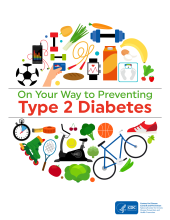Prediabetes: Understanding the Condition
Prediabetes is the condition when a person’s blood sugar levels stay higher than normal. About one-third of adults in the U.S. have prediabetes. Many of them haven’t been diagnosed. Prediabetes can cause serious damage to your health, especially your heart. It can lead to type 2 diabetes, which has an even more serious impact on your health. Type 2 diabetes is the seventh leading cause of death in America.
Type 2 diabetes is a high-cost disease to treat. Many patients with type 2 diabetes pay more than twice as much for their health care. Those with type 2 diabetes may lose their legs, feet, or toes.
Along with type 2 diabetes, prediabetes can lead to other serious conditions, such as:
- Heart disease
- Stroke
- Kidney failure
- Alzheimer’s disease
- Blindness

However, prediabetes doesn’t have to become type 2 diabetes. You can take steps to prevent prediabetes. You can even reverse prediabetes and lower your risk for other conditions. You can reverse prediabetes, but you can’t reverse type 2 diabetes.
You can stop both in their tracks.
Why reverse prediabetes?
There is a long list of reasons to start taking action as soon you learn you have prediabetes. All the reasons lead to the same conclusion: waiting too long to address your prediabetes can have life-long effects. Taking steps now is your best chance to reverse this condition. You need to take action before it turns into a chronic disease, like type 2 diabetes, which can only be managed and never completely cured.
If you ignore prediabetes:
- It worsens and can become type 2 diabetes
- With type 2 diabetes, health care costs could increase by nearly $10,000 each year
- Your risk increases for heart disease, kidney disease, and stroke
If you address prediabetes:
- You’ll greatly reduce your risk for type 2 diabetes (your risk is reduced even more if you’re over the age of 60)
- Diabetes-related health care costs won’t increase
- Overall health improves, energy levels can increase, and stress levels can decrease
Learn the truth
A healthy, active lifestyle can prevent or reverse prediabetes. However, remember that many prediabetes risk factors are out of your control. Factors that make a difference include where you’re born and grow up, your exposure to trauma, family income, and where you go to school or work. Age, gender, race, and family history all impact your risk.
Poverty, stress, use of harmful substances, and poor access to health care may put you at higher risk. If you focus on things within your control, you can lower the impact of these other factors.
If left untreated, prediabetes can cause permanent harm to your pancreas.
Your pancreas is the organ in your body responsible for creating insulin. Insulin breaks down sugar into energy. High blood sugar occurs when your cells stop responding to the insulin produced by your pancreas. It means the sugar isn’t breaking down into energy. This can cause your pancreas to produce more insulin and/or stop producing enough. Over time, this can harm your pancreas.
Find out if you’re at risk.
More than 88 million Americans have prediabetes. At least 4 out of every 5 don’t know they have it. You can have prediabetes for years without showing any clear symptoms. That means the condition can go undetected until you have a serious health problem. That could be heart disease or type 2 diabetes.
Don’t delay. Find out today if you’re at risk. Take the 60-Second Type 2 Diabetes Risk Test.
Of course what you eat affects your blood sugar. However, diabetes isn't caused by sugar alone.
Type 2 diabetes develops when the pancreas is unable to produce enough insulin, or the body starts to resist it. While health experts don’t know exactly why this happens, genetics and environmental factors make a difference. That’s why making positive lifestyle changes work so well to help people prevent and manage diabetes.
Older adults may have a higher risk, but so do many others.
At least 1 in 5 young people between the ages of 12 and 18 have prediabetes, even if they don’t know it yet. And 1 in 4 adults under the age of 34 have prediabetes, too. That’s why it’s important for people of all ages to know the risk factors for prediabetes
While body weight can be related to health, being overweight doesn’t guarantee any condition. This includes prediabetes and type 2 diabetes. High blood sugar levels aren’t caused by weight alone.
A person’s genetics, lifestyle, and chances to make healthy choices all play a part. There are many small changes you can make—and programs you can join—to help lower your blood sugar. This will reduce your risk for prediabetes and type 2 diabetes.

Most pregnant people have some insulin resistance late in the pregnancy.
For many, that resistance continues even after their pregnancy ends. This is especially true if their blood sugar levels were already higher than normal before they became pregnant. About half of women with gestational diabetes go on to develop type 2 diabetes after the baby is born.
If you had gestational diabetes, talk to your doctor about getting tested for prediabetes.
Unlike type 2 diabetes, prediabetes is reversible.
If you have prediabetes, now is the perfect time to take control of your health. You can lower the high blood sugar levels that are damaging your health. Making lifestyle changes can help you get rid of your prediabetes.
Take steps today. It will lower your risk for type 2 diabetes later in life.
Being a little more active, eating a little better, and losing just a little weight can make a big difference.
You don’t have to give up all the things you love. You don’t have to run marathons to reverse prediabetes and prevent more serious conditions, like type 2 diabetes and heart disease. And you’re not alone. There are programs that can help.
Learn about Lifestyle Change Program Details.
Resources
Follow these links to proven tools and tips on prediabetes and how to prevent prediabetes.
Resources from the CDC (Centers for Disease Control and Prevention)

- About Prediabetes and Type 2 Diabetes
- Lifestyle Change Program Details
- Why Participate?
- A Change for Life
Other resources
Are you at risk?
The sooner you learn you’re at risk for prediabetes, the better. Knowing you’re at risk allows you to start making a few lifestyle adjustments. Small changes can fix the high blood sugar that may be damaging your health. Take steps right away, before you develop type 2 diabetes.
Take the 60-Second Type 2 Diabetes Risk Test
You can reverse prediabetes
You have the power to prevent or reverse prediabetes. Learn about lifestyle changes to improve your health. We’re here to help you find answers, support, and more. Talk with your health care providers to see how they can help you. Start making healthy changes today!




